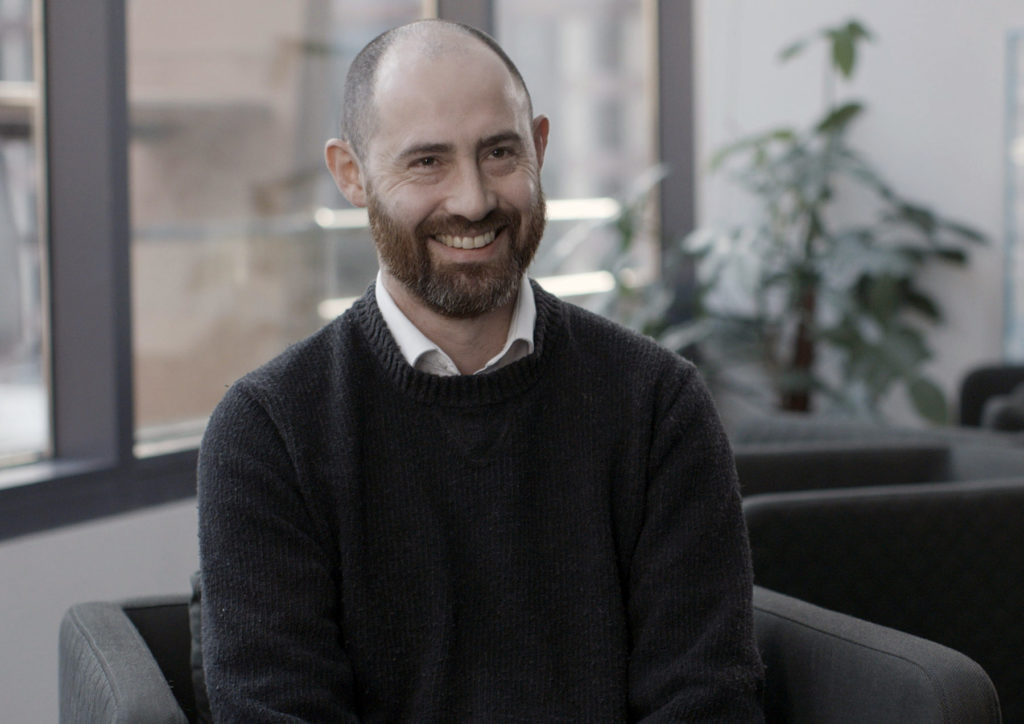Chess, Tolstoy and a Hippocratic Oath

When I walked into the room to interview Dr. Ben Hurst, he was slouched in the chair playing chess on his phone. I had disappeared downstairs just for a moment to grab a pen and he was already several moves into a fresh game. It’s one of the things you learn quickly about Ben. He has a love for chess and anything else that puts his mind to the test.
Spend a little more time with him and you’ll learn he’s a fanatical fiction reader and a born storyteller too. While he’s consumed a good amount of non-fiction, his bookshelf is dominated by the fictional classics, which he describes “as food for the soul.” Hearing him talk, you can immediately tell the works he’s consumed by the greats, like Leo Tolstoy, John Steinbeck and Cormac McCarthy, permeate his approach to the people and problems he encounters.
Most addresses to his team begin with some metaphorical story or cryptic analogy about a fish lost in the ocean or an African American man who used stoicism to weather 40 years in solitary confinement. It’s all part of the fun for him – capture their curiosity. When I ask him about the beginnings of HotDoc, it’s no different.
“I come from three generations of doctors. Both my paternal grandparents are doctors and so is my mother and father. My Mum is a GP and Dad an ENT. I have vivid memories of sitting by the dinner table listening – particularly to my Mum – talk about her frustration with dealing with the red tape bureaucracy imposed on her by Medicare and how stressful that part of what she did was.
“I think I saw that there was no one looking after the doctors. I felt that my Mum as a GP simply had no one who had her back, and I think I wanted to do something about that.”
Ben studied medicine at Melbourne University and did his clinical training at Royal Melbourne Hospital where he gravitated towards psychiatry before eventually leaving the profession and going on to be an entrepreneur.
He explains that it was the morality of medicine that first drew him in. “I love the ethics of medicine. I love just the basic notion that the doctor’s job is to help people get better. There’s something really pure and noble about that.”
But while it was the philosophy of medicine that drew him in, it was the urge to be creative that eventually pulled him away. “Although I loved many aspects of medicine, I found at least at the time that it didn’t have a big creative outlet, which is something that’s definitely inside of me.”
Still, before making his start as an entrepreneur, he worked as an Emergency Resident and then as a Psychiatry Registrar in a rehabilitation unit at Port Phillip Prison.
A lesson from being a prison psychiatrist
The prison story is always the one that stuck with me when I first came on board at HotDoc two and a half years ago. It connected a lot of the dots in my mind. There is a steady, unfaltering earnestness to Ben. Whether he’s interviewing you for a position in the company, and really trying to dig into what drives you and why you want to be a part of the team, or he’s brainstorming ideas with you, scratching notes on paper, there is a humility and a respectful candidness to the way he goes about things.
I suspect working with the inmates at Port Phillip Prison helped strengthen this piece in him as well as giving him the fearlessness required to be such a successful CEO.
When I ask him what was one of the most interesting lessons he took from his experience at Port Phillip, he explains that it was probably learning how to reframe his role.
“I think at least in the early stages, I was perceived as a bank teller,” he explains. “A sleeping pill was worth $20 in prison, and at the time, the inmates were making $4/hour working in the yard. So, if they managed to convince me to prescribe them 10 sleeping pills, then that’s the equivalent of 50 hours of work.
“Obviously this isn’t a good framing of a health care experience. But one of the smart things that I did early was actually create a rule for myself, that I would no longer prescribe those medications.
“Once that was a rule, when prisoners came in and gave me their nonsense symptoms, I was able to just say upfront, ‘I don’t prescribe those pills. That’s not part of what I do’. By constraining myself and what I could prescribe, this was actually a huge enabler of instigating a potentially positive health care experience.”
I can tell these experiences also sharpened his detection of deceit. Ben’s not a man you can easily pull a fast one over. He’s always digging in, looking for the greater truth you’re trying to get at. Just being around him, you get a sense he’s picking up more from your body language than your words.
But beyond just learning hard skills, I can tell these experiences of squaring off with highly complex patients fuelled his own love of stories. So much so that eventually, when he did feel drawn to pursue other things, he took with him these stories as well as the richness of the people who told them. In fact, his experiences became the backbone of his next pursuit – a novel about a Vietnamese prisoner.
The unfinished novel in New York
Leaving behind Port Phillip Prison, Ben headed to New York and began writing a novel under the stewardship of author Patrick McGrath. He shares, “I think, for a long time, I was looking for a way out of medicine. And then the prison stuff happened and I was like, ‘Wow, there’s actually something really good here. There’s a kernel of something that I’m getting professionally excited about’.
“For a long time I was working on my writing and reading a lot more fiction than books about health care and psychiatry. I wanted to become a writer. I had written some short stories. They weren’t fantastic, but I had a great idea for a book and I had a close mate who was planning on doing an MFA in New York. It seemed like a great way to burn the boats. I could not practice medicine in the US at that time, so it was like I would be forced to write.
“The book only ended up two thirds finished. I ran out of money after a couple of years living a little too fun of a life in West Village. It was while I was winding down my New York experience that HotDoc kind of fell into my lap.”
The conception of HotDoc
The birth of the idea for HotDoc is as serendipitous as a Hollywood feature. Ben was sitting in a bar feeling a little down at the thought of returning home, his novel unfinished and his bank account at near zero.
He was with some friends who were studying MBAs at Columbia University. One of them had brought along a friend who mentioned a company that had recently raised $100M in venture funding. The company was a platform that allowed patients to make online bookings with doctors.
Ben describes it as a lightbulb moment. “It was so simple- it just touched a nerve. I can’t even explain why it touched a nerve, but it just did. I remember almost not being able to have a normal conversation once he had told me about it because I was just thinking about it so much.”
Returning to Melbourne, Ben spent around six-months incubating the idea and teasing it out before meeting with Simon Holland (HotDoc Co-Founder) and Tom Spacek (HotDoc CTO) to discuss the idea. Co-Founders of Papercloud Ventures, Simon and Tom immediately saw the potential in the idea.
Ben shares, “They really liked the idea. They liked me. We had good chemistry. So, we decided to team up. That was important because I’d gone through two very lonely years and I don’t think I could have been the sole founder of HotDoc. I just think it is pretty lonely to do that.”
Using Papercloud’s developers to build the minimum product, Ben’s idea finally started to take shape as a commercial product in 2012. He shares, “We started taking appointments in my mum’s clinic. Then I got my cousin really drunk one night and he agreed to be a customer.
“Eventually, the software didn’t glitch out for most appointments and we had a product. And so we started selling it locally. That’s the beginning, I guess.”
Since then, HotDoc’s product suite has expanded from Online Bookings to Recalls, Reminders, Results, Inform, Check-In, Concierge, New Patient Registration, Place in Queue, and most recently, Payments and Quick Consults.

The secret sauce to HotDoc’s success
If you ever ask Ben what led to the success of HotDoc, he’ll always give credit to his people and the company’s solid ethical footing. He says, “Right from the get go we drew a line in the sand about how we would do business. We made a promise to protect patient privacy and to place the doctor-patient relationship above all else by promoting continuity of care.”
This promise, a hippocratic oath if you like, was one of the very first things to go up on HotDoc’s website. Since that time, HotDoc has built an unfaltering reputation among clinics as being intensely values-driven.
Ben credits the adherence to this ethical nature to the staff at HotDoc. “I think one thing all HotDoc people have in common, apart from maybe a zany sense of humour, is that they are all very values-led people. They don’t drink the kool aid. They speak up if they don’t think something is right.”
“There are 3 core values in HotDoc. Always be Empathetic, Take Ownership, and Speak Up. These values are fostered by being placed all around HotDoc’s Melbourne office. They are also a key selection criteria when recruiting a new face to the HotDoc team.”

When I asked what the values mean to him, Ben explains, “Take ownership is important because as the company grows, it’s really easy to defer responsibility. I think it’s so important that everyone in a company, whether they’re in a position of leadership or not, that they understand that the way you learn is by attributing as much responsibility as you can to yourself. Especially when things don’t go to plan. It helps build leadership and it helps people put a stake in the ground and say, ‘I own that’..
“Speak up is about proactively sharing your ideas and being accountable for them, in the sense of, if your ideas aren’t heard the first time, then try again. But also, speaking up means actively listening, so that when people who may be a little more shy to share their ideas, those ideas are not shot down, but they are listened to and talked through.
“And the last one, always be empathetic, well, this is the central tenet for both good health care and a good workplace culture. Health care is delicate. There are a lot of pressures and we have to be deeply respectful of these. And when we build health technology that can impact people at their most vulnerable, we need to think about what it means to be in their shoes.
“So, as much as possible, our employees need to think about what it is to be a patient and what it is to be a health professional or a customer of ours, as well as what it is to be a supportive colleague. It’s that constant trying to imagine what it is like to be in someone else’s position that helps us to have really constructive dialogue and to help each other and the people who use our service.”
HotDoc today, and what’s in store for the future
Seven years on since launching HotDoc, the company looks nothing like it once did. Each week, new faces join the team. Today, HotDoc is Australia’s largest patient engagement platform seeing 1M bookings a month shared out to its 14,000 GPs. The HotDoc app is the #1 Medical app in the Apple Store and places in the ‘Top 100’ on the Google Play Store out of more than 2.3 million apps.
And, the future is only looking brighter. Recently, HotDoc began advancement into the specialist space, commencing a partnership with Genie Solutions who provides software to more than 21,000 medical specialists. The partnership with HotDoc is the first for Genie’s new cloud marketplace.
This is big news for HotDoc. As Ben shares, “I’m really excited to close the loop on a good patient experience. To have it so patients and GPs and any specialists involved can all seamlessly communicate through one system.”
For myself, who came onboard when the company was one fifth its size, there is no doubt HotDoc has changed. And, yet when you talk to Ben one-on-one, you get the impression the business never left the garage. While his plans are audacious and his confidence strong, his care for the little man, whether a 1 GP clinic or a junior employee, remains unwavering.
He places care and kindness ahead of all else; a quality that has managed to permeate every nook and cranny of the HotDoc team. He’s dedicated to making sure that the culture and ethics at HotDoc always stand true. And while I’ve always thought that this is perhaps the hardest thing to do—harder than connecting thousands of doctors with millions of patients—when you work inside HotDoc, you can’t help but believe it. For you soon learn it’s the goal he places above else.



